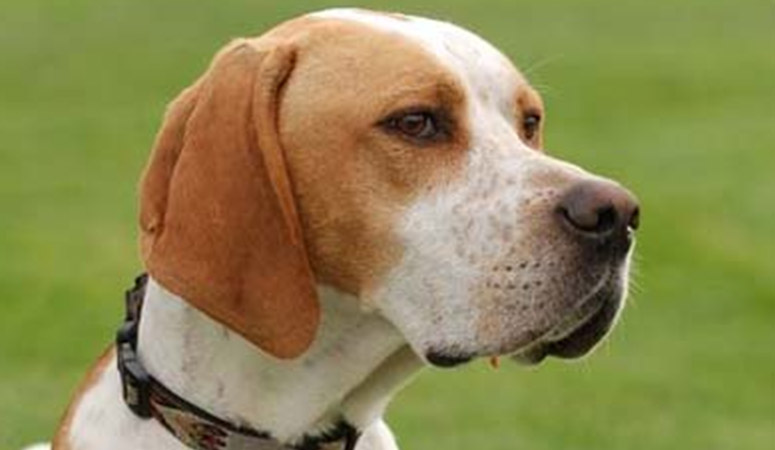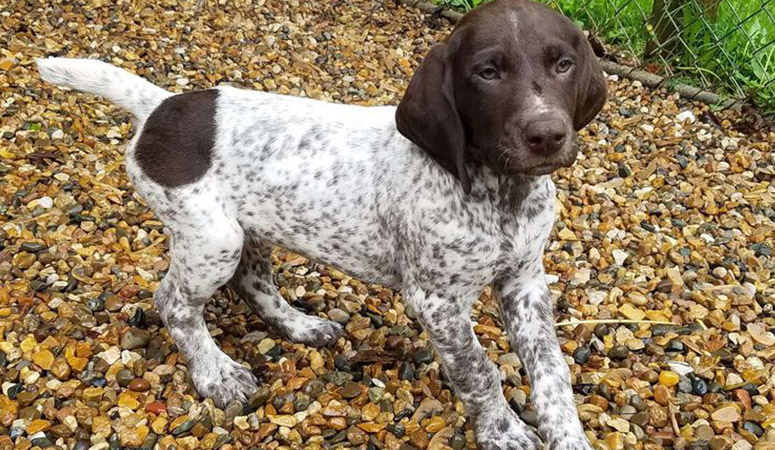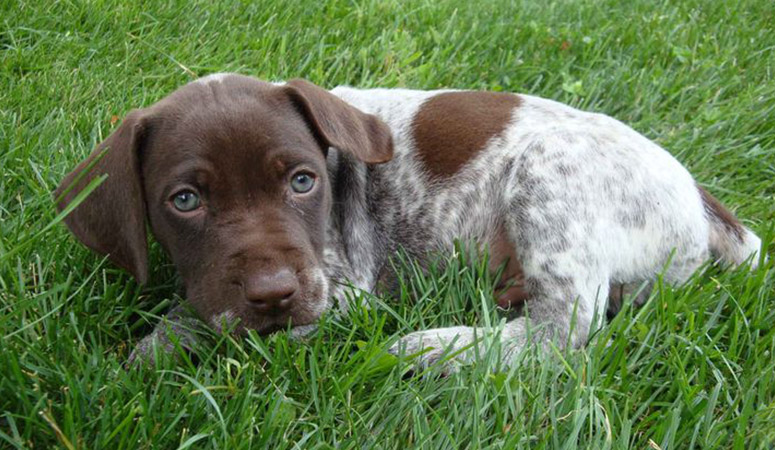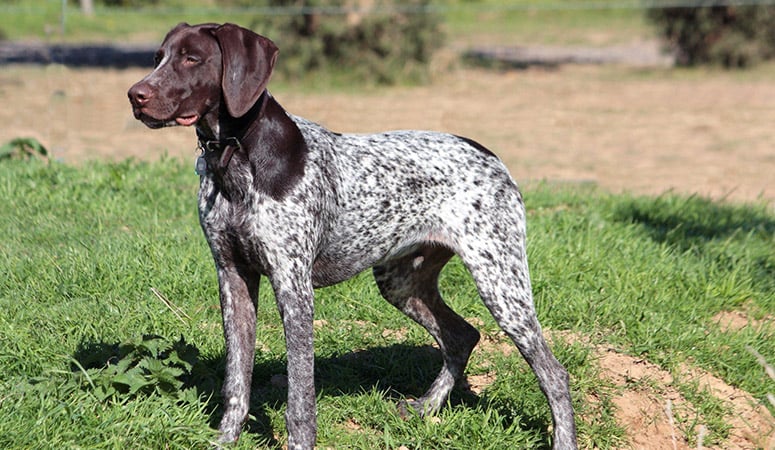Pointer
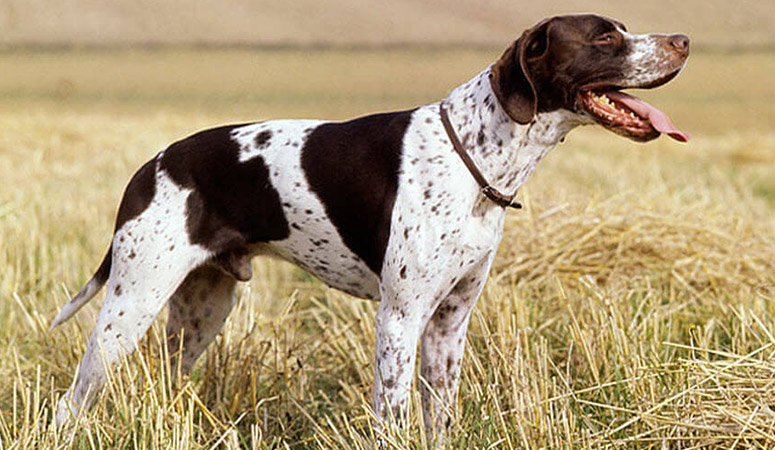
With short and dense coat, the Pointer has a clean streamlined appearance, and he combines athletic grace and power with a noble head, noble carriage, a lean, muscular body, and alert expression. Agility, focus, and ace scenting skills make them exceptional field companions for centuries. Congenial and enjoying spending quality time with their families, the breed makes excellent playmates for children, adults and other dogs.
| Other Names | English Pointer, Pointer |
| Color | Black, Lemon, Liver, Orange, Black & White, Lemon & White, Liver & White, Orange & White |
| Height | Males: 25-28 inches. Females: 23-26 inches. |
| Weight | Males: 55-75 pounds. Females: 44-65 pounds. |
| Life Span | 12-17 years |
| Personality | Loyal, Hardworking, Even-Tempered |
| Exercise | Needs Lots of Activities |
| Origin |
| Popularity | #115 |
| Groom Needs | Weekly Brushing |
| Kids Friendly | Yes with supervision |
| Dog Friendly | Yes |
| Watch Dog | |
| Family Dog | Yes |
| Litter Size | 8 and 12 puppies |
Pointer Pictures
Pointer Video
Introduction
The Pointer dog is powerful yet beautifully graceful to look at, and as his name suggests, he has been used to do just that – point out prey for hunters. He has plenty of energy and capable of agility and speed – this makes him a good running companion to an owner who enjoys running. These dogs are full of affection, making them ideal family pets. The Pointer stands at around 20 inches at the shoulders and weighs about 75 pounds. His coat is short and is mixed with colors such as white with liver, orange, lemon, and black markings; it needs brushing regularly to keep it tip-top condition. Some are just one solid color. He is affectionate and loving, loyal, and devoted to his family. They are also a non-aggressive breed, making them good with children and other pets. They make a good watchdog because of their alert nature. They require regular and daily exercise, being given plenty of opportunities to play off-leash in a garden that is fenced – like most dogs, if left alone, they can become destructive. He is a devoted companion and thrives on positive reinforcement like treats, praise, and other rewards.
Living with Pointer
With short, dense, glossy coat, the Pointer requires minimal maintenance. Begin accustoming your Pointer to being brushed and examined when he’s a puppy. And make grooming a positive experience filled with praise and rewards, and you’ll lay the groundwork for easy veterinary exams and other handling when he’s an adult.
He sheds only lightly, and the regular brushing will help keep hair off your clothes and furniture.
A weekly brushing with a soft-bristle brush or a hound glove will help to remove dirt and loose hair and keep the dog looking his best. Rub him with a chamois and his coat will gleam.
He needs a bath with a shampoo made for dogs three or four times a year to keep the coat and skin from becoming dry, and be sure to rinse thoroughly to prevent itchiness from shampoo residue.
The nails should be trimmed often if not worn down naturally, as overly long nails can cause the dog discomfort and problems walking and running. Handle his paws frequently — dogs are touchy about their feet — and look inside his mouth and ears.
The ears should be regularly inspected and cleaned if needed with soft gauze and an ear-cleaning solution. And eyes should be clear, with no redness or discharge. Your careful weekly exam will help you spot potential health problems early.
Brush your Pointer’s teeth at least two or three times a week to remove tartar buildup and the bacteria that lurk inside it. Daily brushing is even better if you want to prevent gum disease and bad breath.
A healthy Pointer requires about two hours of daily physical activity to remain fit and well behaved, which includes field events, obedience, tracking, agility, rally, and other activities that can be enjoyed by dog and owner.
A vigorous walk isn’t enough. Take him running, teach him to run alongside your bicycle, play Frisbee in the backyard, or train him for agility, flyball, or other dog sports.
As puppies, the Pointers are prone to knocking over knick-knacks and kids. They adore their people and should live indoors with them.
They are not ideal apartment denizens, unless someone is home to take them out frequently. They do well in active homes where hiking, camping, and other outdoor activities are enjoyed by all.
Keep your Pointer inside a securely fenced yard or dog run for his safety and your peace of mind. When they’re given the exercise and training they need, they are quiet and mannerly house dogs.
A Pointer puppy is still growing and doesn’t need the hard exercise that an adult can take, which can increase the pressure on its growing joints and cause orthopedic problems. So let him play and nap on his own schedule throughout the day, and restrict jumping until he’s reached his full growth at about 18 months of age.
Pointers are not natural swimmers, though some may learn to swim and enjoy going into the water, but you should always watch her closely in or near water.
Generally, the Pointers require about 2 to 3 cups of good quality dry dog food each day, given in two feedings, instead of leaving food out all the time. You should consider providing him with a dog food formulated for active dogs, particularly one with high protein content, and make sure that the food is formulated to meet the needs of large-breed dogs. The better the dog food, the further it will go toward nourishing your dog
But this will vary based upon your Pointer’s size, activity level, metabolism and age. You should talk to your veterinarian about the optimal diet and quantity of food for your Pointer.
Treats can be an important aid in training, but giving too many can cause obesity. So watch your dog’s calorie consumption and weight level to keep him in a good shape.
Clean, fresh water should be available at all times.
Learn about which human foods are safe for dogs, and which are not. Check with your vet if you have any concerns about your dog’s weight or diet.
The Pointers are generally healthy, but they are prone to certain health conditions, just like other breeds, such as hip dysplasia, deafness, eye conditions (including cataracts and progressive retinal atrophy), epilepsy, neurotropic osteopathy, and hypothyroidism, etc.
Like other large and deep-chested dogs, Pointers can experience bloat, a sudden, life-threatening stomach condition. So the owners should learn what signs to look out for, and what to do should they occur.
The Pointer’s ears should be checked regularly for signs of infection, and the teeth should be brushed often, using a toothpaste designed for dogs.
There are several health tests considerations specific to the breed, such as ophthalmologist evaluation, hip evaluation and thyroid evaluation.
Responsible Miniature Bull Terriers breeders will test their stock for conditions or communicate with other dedicated breeders regularly, working together for breed health and preservation of the breed’s unique qualities.
Total Annual Cost: $3239
Cost is estimated for the first year and may vary depending on many factors, such as dog food, health care, leash, collar, licensing, possible fencing, crates, training and obedience classes, dog-walking, grooming, treats, toys, flea, tick, and heart-worm meds, microchips, etc.
With strong will, it is important that you start training your Pointer from an early age. Intelligent and alert, Pointers are lightning-quick learners, especially when their trainers are patient, firm, and consistent.
Pointers are versatile! Many have multiple titles before and after their names, indicating their ability to perfect their inherent talents and happily learn new ones.
The Pointer’s amiable, even temperament and alert good sense make him a congenial and trainable companion both in the field and in the home. Pointers are versatile gun dogs, making superlative upland hunters and strong retrievers as well.
Pointers are natural athletes and excel in dog sports and agility training. This breed can be trained for pointing, honor, and retrieving though, in reality, they will enjoy any sport or game you teach them.
Involving them in these activities is a great way to ensure this energetic dog gets the activity she needs to be happy and healthy.
Pointers have also been known to excel at service and therapy work, as well as in search-and-rescue.
History
The Pointer is believed to have originated from Spain; but like a lot of the dog breeds, their history is not all that clear. In England, there are dogs known as pointing-type dogs that been around for as way back as 1650. But some say English officers brought the Spanish Pointers back from the Netherlands. The Netherlands at that time was under Spanish control in 1713, when the British officers participated in the war of the Spanish Succession.
A lemon and white Pointer called Sensation was imported into America in 1876, becoming the emblem of the Westminster Kennel Club, which was founded in 1877.
Judy was an English Pointer that was the only dog to be registered as a Second World War Prisoner of War!
You can see the shape of the Pointer – the long head, the finely pointed tail; always lifting that one foot off the ground to point the hunter in the direction of the prey. Thanks to its sporting heritage, this breed is a natural at sports.
It’s very likely that the Pointer arrived in America with the early colonists. They were recognized by the American Kennel Club (AKC) when it was founded in 1884.
There were two very famous British Pointers called Pluto and Juno; owned by Colonel Thornton.
The American Pointer Club was founded in 1938. Today, the Pointer is fairly uncommon.
Helpful Information
Breed Club: AMERICAN POINTER CLUB, INC.
Breed Club Link: http://www.americanpointerclub.org/
Breed Club Rescue: The American Pointer Club
Breed Club Rescue Link: http://www.americanpointerclub.org/ForeverFriends.shtml

